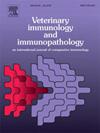Pregnancy-induced changes in the toll-like receptor pathway in the ovine duodenum
IF 1.4
3区 农林科学
Q4 IMMUNOLOGY
引用次数: 0
Abstract
Toll-like receptor (TLR) signaling plays a key role in the intestinal innate and adaptive immune responses, and pregnancy has effects on intestinal length and villus height. Nevertheless, it is unclear if early pregnancy modulates the expression of TLR members in the duodenum of ewes. In this study, ovine duodenums were obtained at day 16 of the estrous cycle (N16), and days 13, 16, and 25 of gestation (P13, P16, and P25) from ewes, and mRNA and protein expression of TLR members were analyzed. The results showed that early pregnancy increased the expression of TLR3, TLR5, and TRAF6, but did not influence TLR4 expression. In addition, there were increases in expression of TLR2, MyD88, and IRAK1 at P13 and P16, or only at P16 compared to N16 and P25. In summary, these data suggest that early pregnancy modulates the TLR signal pathway in the maternal duodenum, which may be related to the immunoregulation and adaptation of the maternal duodenum in the ovine.
妊娠诱导的绵羊十二指肠toll样受体通路的变化
Toll样受体(TLR)信号在肠道先天性免疫反应和适应性免疫反应中起着关键作用,妊娠对肠道长度和绒毛高度有影响。然而,目前还不清楚早期妊娠是否会调节母羊十二指肠中 TLR 成员的表达。本研究采集了发情周期第 16 天(N16)、妊娠第 13、16 和 25 天(P13、P16 和 P25)的母羊十二指肠,分析了 TLR 成员的 mRNA 和蛋白质表达。结果表明,妊娠早期会增加 TLR3、TLR5 和 TRAF6 的表达,但不会影响 TLR4 的表达。此外,与 N16 和 P25 相比,TLR2、MyD88 和 IRAK1 的表达在 P13 和 P16 增加,或仅在 P16 增加。总之,这些数据表明,妊娠早期会调节母体十二指肠中的TLR信号通路,这可能与绵羊母体十二指肠的免疫调节和适应有关。
本文章由计算机程序翻译,如有差异,请以英文原文为准。
求助全文
约1分钟内获得全文
求助全文
来源期刊
CiteScore
3.40
自引率
5.60%
发文量
79
审稿时长
70 days
期刊介绍:
The journal reports basic, comparative and clinical immunology as they pertain to the animal species designated here: livestock, poultry, and fish species that are major food animals and companion animals such as cats, dogs, horses and camels, and wildlife species that act as reservoirs for food, companion or human infectious diseases, or as models for human disease.
Rodent models of infectious diseases that are of importance in the animal species indicated above,when the disease requires a level of containment that is not readily available for larger animal experimentation (ABSL3), will be considered. Papers on rabbits, lizards, guinea pigs, badgers, armadillos, elephants, antelope, and buffalo will be reviewed if the research advances our fundamental understanding of immunology, or if they act as a reservoir of infectious disease for the primary animal species designated above, or for humans. Manuscripts employing other species will be reviewed if justified as fitting into the categories above.
The following topics are appropriate: biology of cells and mechanisms of the immune system, immunochemistry, immunodeficiencies, immunodiagnosis, immunogenetics, immunopathology, immunology of infectious disease and tumors, immunoprophylaxis including vaccine development and delivery, immunological aspects of pregnancy including passive immunity, autoimmuity, neuroimmunology, and transplanatation immunology. Manuscripts that describe new genes and development of tools such as monoclonal antibodies are also of interest when part of a larger biological study. Studies employing extracts or constituents (plant extracts, feed additives or microbiome) must be sufficiently defined to be reproduced in other laboratories and also provide evidence for possible mechanisms and not simply show an effect on the immune system.

 求助内容:
求助内容: 应助结果提醒方式:
应助结果提醒方式:


